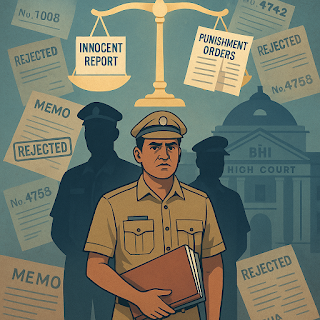The Patna High Court recently delivered a judgment in the case of Nirmal Kumar v. The State of Bihar, addressing significant procedural lapses in a disciplinary proceeding against a police officer. The court’s decision highlights the importance of adhering to established legal procedures, even within departmental inquiries.
Background
Nirmal Kumar, a Sub Inspector in the Bihar Police, faced a departmental inquiry following a complaint, which led to the registration of a First Information Report (FIR). The inquiry resulted in a charge memo being issued to Kumar by the Senior Superintendent of Police, Bhagalpur. The Deputy Superintendent of Police, Bhagalpur, conducted the inquiry and submitted a report in which Kumar was found to be innocent.
Despite the inquiry report, the Disciplinary Authority, Bhagalpur, imposed a penalty on Kumar: forfeiture of six months’ increment. Kumar challenged this decision before the appellate authority, which upheld the disciplinary order. His subsequent appeal/memorial to the Director General of Police was also rejected. Aggrieved by these decisions, Kumar filed a writ petition before the Patna High Court, seeking to quash the orders issued by the Director General of Police, the appellate authority, and the disciplinary authority.
Issues Raised Before the High Court
The High Court considered several key issues:
Whether the charge memo was issued by a competent authority.
Whether reliance could be placed on the contents of documents without them being formally proved by witnesses.
Whether the orders passed by the disciplinary and appellate authorities were flawed, because they were not the appointing authority, and whether there was a violation of Rule 18(3) of the Bihar Government Servants (Classification, Control and Appeal) Rules, 2005 (Bihar CCA Rules).
Decision of the High Court
The High Court’s decision rested heavily on procedural compliance. It addressed each of the issues as follows:
Competent Authority: The Court examined the applicability of the Bihar Police Manual, 1978, and its Appendix-84, which specifies the authority of the Superintendent of Police to issue certain orders, including those related to minor punishments. The Court also cited a previous decision, Uday Sharma v. The State of Bihar, which upheld the state government’s right to take action in cases of misconduct. Based on this, the High Court concluded that the charge memo was issued by a competent authority.
Proof of Documents: The Court referenced Roop Singh Negi v. Punjab National Bank, which established that in quasi-judicial proceedings, once documents are exhibited and acknowledged by witnesses, there is no strict requirement for formal proof of the facts contained in those documents. Therefore, the High Court rejected the petitioner’s argument that the contents of the documents were not properly proved.
Violation of Bihar CCA Rules: This was the crucial issue upon which the petitioner succeeded. The Court analyzed the Bihar CCA Rules, 2005, distinguishing between the procedures for imposing major and minor penalties. While Rule 18(3) applies to major penalties, Rule 19 governs minor penalties. The High Court found that when a disciplinary authority disagrees with an inquiry officer’s report that exonerates the accused, Rule 19, in conjunction with Rule 18(3), mandates that the disciplinary authority record its own findings, provide a copy of the inquiry report and its findings to the accused, and allow the accused 15 days to submit a representation.
In this case, the disciplinary authority had disagreed with the inquiry officer’s report but had not provided Kumar with a disagreement memo or an opportunity to file a representation. The High Court held this to be a clear violation of Rule 19, read with Rule 18(3), of the Bihar CCA Rules, 2005.
Outcome
The Patna High Court found the disciplinary authority’s order to be unsustainable due to the violation of the Bihar CCA Rules. Consequently, the appellate order, which upheld the flawed disciplinary order, was also set aside. The Court also quashed the order passed by the Director General of Police.
The High Court granted the respondent authorities the liberty to proceed further against Kumar, based on the inquiry report, but directed that the proceedings be completed within six months.
Implications
This judgment underscores the importance of due process and strict adherence to procedural rules in departmental inquiries, particularly those involving government employees. It serves as a reminder that even when dealing with internal disciplinary matters, authorities must ensure that their actions comply with the principles of natural justice and the rules established by law. The failure to follow proper procedure can lead to the quashing of disciplinary actions, as seen in this case. This ruling is likely to have significant implications for how departmental inquiries are conducted within the Bihar police force and potentially other government departments, emphasizing the need for fairness and transparency in such proceedings.
Read the full judgement Below;
https://patnahighcourt.gov.in/viewjudgment/MTUjMTU4NCMyMDIwIzEjTg==-8f5Nd4bXDJ8=









